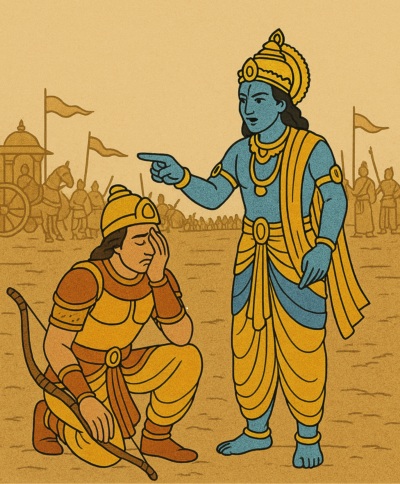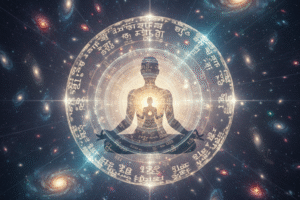
Ch-2|Meaning of Shlokas 1-3
- Posted by Sri Kameswari Foundation
- Date July 15, 2025
- Comments 0 comment
Meaning of Ślokas 1–3
In Arjuna Viṣāda Yoga,Arjuna stands as a representative of all of us,mirroring the doubts,fears, and emotional conflicts that arise in our lives.
He enters the battlefield after years of preparation and penance,with a firm resolve to reclaim his rightful kingdom and uphold his dharma.However,upon seeing his own relatives,teachers, and loved ones standing against him,Arjuna is overwhelmed with sorrow.He slips into despair,wondering how he can fight and kill his own people for the sake of a kingdom.In that moment,he forgets the present and lets his mind spiral into imagined fears of the future.
As we transition into Sāṅkhya Yoga,Bhagavān Śrī Kṛṣṇa begins to impart the knowledge that dispels fear—just as darkness vanishes in the presence of light.Through immense compassion, Śrī Kṛṣṇa uplifts Arjuna,and through him,uplifts all of humanity.
To uplift someone who is in distress,the first step is to reassure them—remind them that their fears are not as real as they seem.One must help them reconnect with their inner strength and virtues,which they may have forgotten in their emotional turmoil.
This is exactly what Śrī Kṛṣṇa does.He addresses Arjuna as Parantapa—“the one who scorches his enemies”—to remind him of his greatness and potential,even though he is momentarily lost in sorrow.
Śloka 2: “O Arjuna! What you are doing now is unworthy of an Ārya.”
Here, Ārya does not refer to race or ethnicity but to a noble-minded person—one who has studied under a worthy Guru in a Gurukula, renouncing worldly pleasures and focusing on true learning. An Anārya is one who fails to grasp essential knowledge and acts out of delusion.
It is important to correct the false narrative created by the Aryan Invasion Theory, which has long misrepresented this sacred term and caused division within our own civilization.
Śrī Kṛṣṇa tells Arjuna that his current mindset is unbecoming of an Ārya. His actions will not lead him to svarga (higher realms), and worse, they will cause a loss of honor—not only during his lifetime but even after death. People will remember not his virtues but his retreat from responsibility at a critical moment. Śrī Kṛṣṇa questions: “Why have you succumbed to this delusion?”
Śloka 3: “O Arjuna,son of Kuntī! Do not yield to cowardice.This weakness does not suit you.”
This kind of fear and despondency is unworthy of someone like Arjuna. Śrī Kṛṣṇa urges him to cast off this cheap weakness of the heart.Again,he calls Arjuna Parantapa—not just as a compliment,but as a psychological upliftment,helping Arjuna rise from within.
Śrī Kṛṣṇa calls on Arjuna to shift from misplaced compassion (which comes from identifying the body as the Self) to true understanding. He asks him to awaken, to rise, and to take his stand in the battlefield—not merely of Kurukṣetra, but of life and dharma.
You can also listen to this in Telugu from our Āchārya,Dr. Jammalamadaka Suryanārāyaṇa garu,by clicking the video below.
You may also like

Ch-2|Meaning of Shlokas 18-23

True Scholar,Analogy of Clothes

